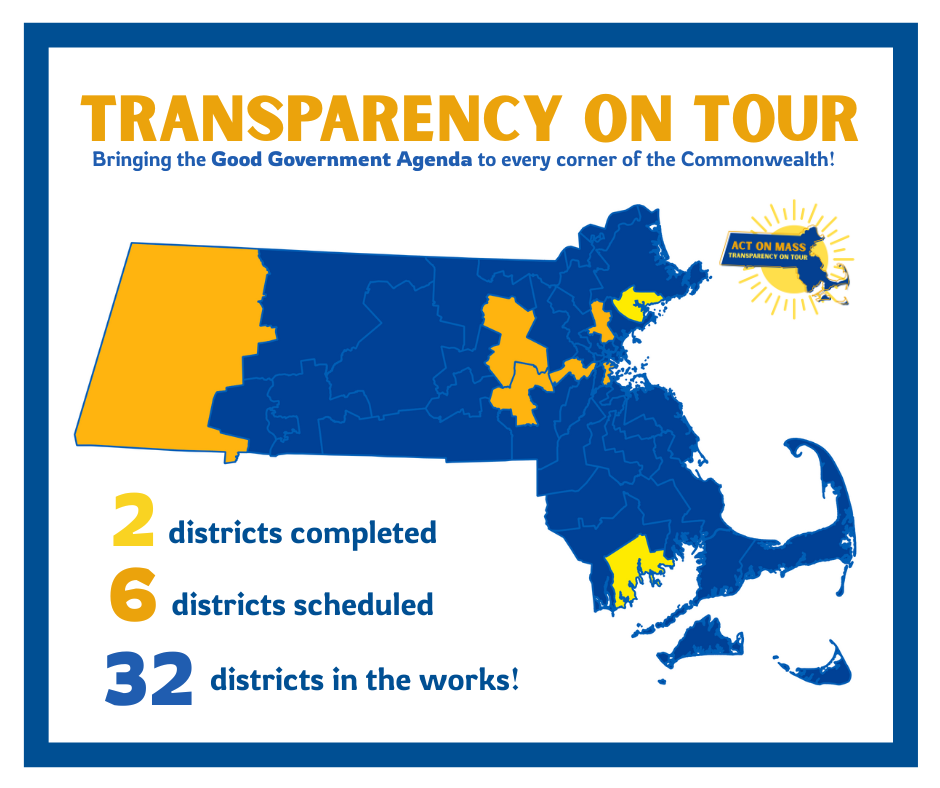Good evening,
We're back on the road this weekend for Transparency on Tour, with a fantastic run at New Bedford Pride today and gearing up for Newton Highland Village Day tomorrow. We've got stops later this week in Reading and Natick. Still not too late to sign up to volunteer if you've got time to pitch in!
JOIN US ON THE ROAD THIS SUMMER>>
Outside of our tour, we've got some exciting stuff coming up. One: we'll be hosting regular State House 101 workshops throughout the summer, so that anybody who's just finding out about our movement can immediately learn more. Our first workshop will be held June 16th at 6:30 p.m on Zoom.
Whether you're a seasoned Scoop reader or a new member just joining us today from New Bedford, please feel free to join us for a review of how our broken state house works and what we can do about it. And if you have a friend or two that could benefit from an overview, let them know.
RSVP FOR STATE HOUSE 101 JUNE 16th>>
And without further ado, .
.
---
State House Scoop
High and mighty: Mariano blames ballot process for lack of clarity in current cannabis law, which he rewrote in 2017
The House passed a bill Wednesday to overhaul the state’s embattled Cannabis Control Commission (CCC), which is the body that implements cannabis law in Massachusetts.
The bill, H.4160, was released from the House Ways & Means Committee Wednesday and voted on by the full House just hours later. Representatives filed 45 amendments to the bill, most of which concerned small changes to cannabis policy. In classic MA House fashion, almost all of these amendments were withdrawn without a vote. The few that weren’t were clearly pre-approved by leadership and passed easily.
In State House News Service, reporter Colin A. Young puts it bluntly: “Representatives have the option of trying to force public debate and votes on their amendments but the House under Speaker Mariano has often opted to dispense with most amendments following off-floor private debates.”
This move to reform the CCC comes after years of the commission being embroiled in internal crisis, including a firing of its chairwoman that ended in a protracted legal battle. The House’s new structure would reduce the number of commissioners from 5 to 3 and centralize appointing authority under the governor, with the goal of improving and streamlining accountability.
Of interest to us, however, is the comments that Speaker Mariano made about the change.
For those that hardly remember a time before weed billboards adorned every hill on the Mass Pike, cannabis was legalized via statewide ballot question in 2016. Legislative leaders response to a more recent ballot question– that is, the legislative audit passed by 72% of the voters (still waiting!)– has made it pretty clear how they feel about voters’ exercise of our own power at the ballot.
Speaker Mariano used the cannabis bill to harp on this point. Asked what caused the challenges with the existing CCC structure, Mariano explicitly blamed the fact that it was passed at the ballot. Quote: “we've been railing against government by referendum, and this is a perfect example why it doesn't work.”
His response seems to have baffled reporters. In fact, the ballot question originally passed by voters came with a 3-commissioner structure with a single appointing authority– very similar in structure to the reform proposed this week by the House. The current (ineffective) structure, in which 5 commissioners are appointed by 3 different authorities, was created when the legislature reworked the law in 2017.
Here’s the kicker– the lead House negotiator in those 2017 deliberations, responsible for hammering out the final version of that ill-fated structure? None other than Quincy’s finest Ron Mariano, who was House majority leader at the time.
But blaming the ballot process is so much more fun!
The fate of the House's cannabis overhaul is currently unknown; the Senate has not announced this as a major priority for the session and does not appear poised to take it up with any urgency. Another sleepy development in an unfortunately sleepy session.
Transparency on Tour: News from the Road
We had a great time at the second stop on the tour today: New Bedford Pride. As we criss-cross Massachusetts and speak to residents across the state, I plan to share some stories from the folks we meet. There are many ways that inaction and democratic backsliding on Beacon Hill impact our lives here, which may not always be apparent right away.

Although it didn’t come in the context of a Transparency on Tour stop, I did run into one of these examples “on the road” this week– let's get into it!
A family friend of mine is planning a move to MA from out of state. She’s been busy apartment hunting around the Boston area and recently scored the perfect place. However, when it came to applying for the apartment, she was confused by something she’d never seen before: an exorbitant brokers fee, totaling a whole month’s rent, although she hadn’t hired a broker. Combined with security deposit and first and last month’s rent to the landlord, this additional fee made the cost of signing the lease prohibitively expensive– even though she could afford the rent.
She texted me to ask if this is typical and I had to groan. Yes, typical in Massachusetts. Currently in a legal gray area. And the bill that would fix it is– like most issues in our fair Commonwealth– stuck in legislative limbo. Unfortunately, when you ask the executive director of Act on Mass for advice on a rental issue, you get a lot more information than you asked for!
The Senate actually passed a provision targeting renter-paid broker fees last summer, as part of a massive housing bond bill. This was not in the House version of that bill and did not make it through negotiations. At the beginning of this session in January, Spilka referenced ending renter-paid broker fees as a main priority. Governor Healey launched a proposal to target these fees a few weeks later, underscoring it as an important priority of this session.
That was January. If my calendar’s right, it’s now June. Legislators seem to forget that they actually can pass legislation all the time. Instead, this legislation got wrapped into the FY 2026 budget negotiations, with different versions of the provision passed by House and Senate. Now it will be a bargaining chip in budget negotiations. We likely won't see the governor’s signature on the budget until the end of July, leaving renters without relief for at least two more months– if the brokers fee provision even makes it to the final version. Here’s what I told my friend: if you can wait until July, this might be illegal. Unfortunately, she can’t.
Indeed, most leases in the Boston area turn over in September. Therefore, the next few months are prime-time for all the stresses that renters face when trying to secure housing in our competitive market for another year. The legislature could have acted to protect renters last year; they could have acted to protect renters in any of the last 5 months by passing this legislation as an individual bill. Instead, they have chosen inaction.
For me, it was an unfortunate reminder that when the state house delays critical legislation, it impacts people we know and love.
Other stories this week
- As federal immigration raids continue to terrorize communities across the Commonwealth, Massterlist asks: "Will this ICE 'surge' spur action" from the legislature?
- Two developments on the MBTA Communities Act this week: A judge ruled that the law is not an "unfunded mandate" and the town of Milton appears to have (mostly) complied with the law after a lawsuit loss
- Trump's travel ban on Haiti will impact communities around Boston– read GBH's coverage
--
Missed a Scoop or two? You can find a full archive of all past Saturday Scoops on our blog.
---
Syd's Sprinkles: A review of MA law on immigration enforcement
While Act on Mass focuses on the lack of transparency in Massachusetts’ Legislature, transparency is a major issue (to varying degrees) in all levels of government. And having been a part of the AoM team for over a year now, I have developed a keen eye for opaque behaviors in all kinds of scenarios.
In a recent opaque action, the United States House of Representatives voted on the “big, beautiful bill” (also known as the One Big Beautiful Act), which is chock full of earmarks and hidden language that even representatives did not read the whole way through, if at all (sound familiar?).
Massachusetts also has a problem with passing legislation in huge bills that includes far too many pages to read in as little time as many representatives are given before voting on it (which you can read more about in a Scoop from a couple of weeks ago).
In the case of the “big, beautiful bill,” U.S. House members were urged to vote on party lines on a bill numbering over 1,000 pages. It passed by a single vote. After, congressmen learned that will harm not only their constituents, but their own interests as well.
For example, Republican congresswoman Marjorie Taylor Greene admitted to not knowing that there were parts of the bill that blocked states from regulating AI for 10 years. In an ironic statement, Greene said, “Full transparency, I did not know about this section,” and that she would not have voted in favor of the bill had she recognized this [paywall]. Greene is only one of many who regret their vote.
On this topic, Michael Gold, a reporter for the New York Times, wrote “The remorseful statements highlighted the realities of legislating in the modern age. Members of Congress, divided bitterly along partisan lines and often working against self-imposed political deadlines, have become accustomed to having their leaders throw together huge pieces of legislation at the very last moment — and often do not read the entirety of the bill they are voting on, if they read any of it at all” [paywall].
By now, it feels as though we are “seeing double,” so to speak, when it comes to transparency at the state and federal levels of government, but what is the ramification of this omnibus bill when it comes to the lives of Bay Staters?
Overall, this bill would only take away from our communities and our most vulnerable community members. The Center on Budget and Policy Priorities has an in depth breakdown of how the bill would impact Bay Staters if it is passed and signed into law (which I recommend reading), but the TLDR is that the bill would:
- Create harsher Medicaid requirements that would leave many without healthcare
- Increase state responsibility for SNAP benefit costs, meaning higher grocery costs overall
- Create harsher requirements for access to food benefits
- Cut jobs and increase prices for clean energy
- Cut investments in universities and change eligibility for Pell Grants, creating higher education costs overall
- Give tax cuts to the wealthiest Bay Staters, which would leave a disproportionate amount of the tax burden to the 99%
- Take away tax credits for low-income families with children
Aside from this, there are other provisions, like the state AI regulation moratorium and the limiting of the power of courts, that put the entire country at risk.
The good news is that the U.S. Senate still has not voted on this bill. With the outspoken regrets of many Republican representatives in Congress, it seems that senators are also beginning to carefully question the bill.
A lack of transparency gives way for opportunities in government like this – where omnibus bills are voted on blindly and on the basis of party lines rather than on the basis of the interests of constituents.
While this legislation is happening at the federal level, we are not completely helpless. We can still reach out to our senators in D.C. who represent us Bay Staters, as well as urge our state representatives and senators to vote on crucial legislation that will protect us from the federal government.
You can also help more people learn about the issue of transparency by supporting and volunteering with us during our Transparency on Tour campaign this summer!
HELP US HIT 40 DISTRICTS THIS SUMMER>>
---
Take Action
We protect us: make sure your rep takes a stand on ICE raids!

Recent violent ICE arrests in communities around Massachusetts have left residents fearful. Governor Healey has come out with more sympathy for ICE than her detained residents and their families. We need legislators to step up and address this. Do you know where your rep stands and what they're doing to protect our communities? Use our form to send them an email!
Pass on the word about a new law: eviction sealing

Thanks to a law passed by the legislature last year, it is now possible in Massachusetts to seal some eviction records that make it hard for renters to find housing! Make sure to pass on the word to any renters in your community.
LEARN MORE ABOUT SEALING EVICTIONS>>
---
And that's all for this week! Enjoy your weekend.
In solidarity,
Scotia
Scotia Hille (she/her)
Executive Director, Act on Mass
